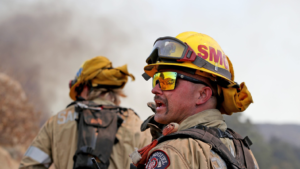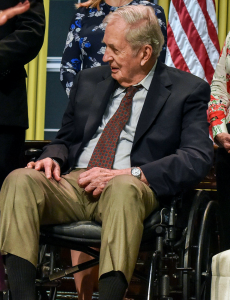Lonnie Coffman, a Capitol protester from the backwoods of Alabama, represents the kind of threat that keeps crime fighters “up at night,” a former FBI profiler said.
Lonnie Coffman, the man accused of driving a pickup truck filled with Molotov cocktails and other deadly weapons to the nation’s capital, lives in a brick ranch house in the backwoods of Alabama.
Coffman had no criminal record. No apparent social media accounts. And no city officials or law enforcement in the area had ever come into contact with him.
“I don’t know him, never heard of him and I haven’t heard of anybody that did know him,” said Ken Winkles, mayor of the 1,300-person town of Falkville, where Coffman’s mail is delivered.
More than 50 people have been arrested on federal charges in the days after a mob of pro-Trump supporters stormed the Capitol on Jan. 6.
Coffman’s face was not among those that have gone viral, and it’s not even clear if he breached the building. But he stands out for the sheer amount of weaponry he brought to Washington.
The 70-year-old Alabama man with no criminal history or known extremist ties represents the worst nightmare for law enforcement, experts say — an apparent lone wolf who operated completely under the radar.
“These are the people who keep law enforcement up at night,” said Clint Van Zandt, a former FBI criminal profiler and an NBC News analyst. “I used to go to bed thinking, ‘Did I do everything I could? Have I looked for this? Have I looked for that?’ But what do you look for in a guy like this?”
The rise of right-wing groups like the Proud Boys and the Three Percenters has become a focus of federal authorities in the era of President Donald Trump. The existence of people like Coffman, loner types who amass large collections of weapons and who may become motivated to act on calls to overthrow the government, pose an even greater challenge for law enforcement.
“When you tell no one what you’re doing and do it yourself in a complete void, the only way we find you is, like this guy was found, we’re awful lucky and stumble upon you,” said Van Zandt, who was among a team of investigators that worked to identify the “Unabomber,” Ted Kaczynski.
Police officers happened upon Coffman’s truck after the authorities received reports of possible explosive devices in the vicinity of the National Republican Club and the Democratic National Committee headquarters.
While sweeping the area with police canines, two Capitol Police officers spotted what appeared to be the handle of a gun on the front-right passenger seat of a red GMC Sierra pickup truck, federal prosecutors said.
The vehicle was parked in the heart of downtown Washington, just a couple of blocks away from the Capitol.
Officers searched the truck and discovered it was equipped for war. Among the weapons found inside the interior and truck bed were: three guns, including an assault-style rifle; hundreds of rounds of ammunition; several machetes; camouflage smoke devices; a stun gun; a crossbow with bolts; and 11 Molotov cocktails in the form of canning jars with gasoline inside and a hole punched at the top.
The officers quickly determined through a vehicle registration search that the truck was registered to a Lonnie L. Coffman of Falkville, Alabama, prosecutors said.
Surveillance camera footage recovered later in the day showed Coffman parking the vehicle around 9:15 a.m. Prosecutors said he stepped out of it five minutes later and headed directly toward the Capitol with a crowd of people. A Trump rally was set to begin nearby at 11 a.m.
When Coffman returned to his vehicle around 6:30 p.m., he was stopped by police manning the security cordon and found to be in possession of two handguns, according to federal prosecutors.
Asked about the contents of the jars, Coffman told the officers they contained “melted Styrofoam and gasoline,” according to a Justice Department detention memo. The products created an explosive mixture that has the effect of napalm in that it causes the flammable liquid to better stick to objects it hits upon detonation, the memo says.
Jim Cavanaugh, a former special agent for the Bureau of Alcohol, Tobacco, Firearms and Explosives, said the homemade devices were designed to act like miniature hand grenades.
“It’s not really going to take down a building,” said Cavanaugh, who is an NBC News law enforcement analyst. “It’s more like a weapon that if someone was in a demonstration they would throw it at the police. And whatever it hits, because of the styrofoam, it keeps on burning.”
“If he went through all the trouble to make them and transport them, he likely intended to use them,” Cavanaugh added.
Cavanaugh, who led ATF field divisions in Birmingham, Alabama, and Nashville, Tennessee, said it was not at all surprising to him that someone from the hills of Alabama would be found with such an arsenal. He said the region is rife with people who are distrustful of government and have an affinity for weapons.
“This guy’s not unusual to me,” Cavanaugh said. “What’s unusual is the target: the Capitol. We’d see people making bombs all the time, but they wanted to kill their boyfriend or the person who cheated on them or once in a while they wanted to attack a prominent figure.”
Coffman lived along a country road in the shadow of Lacon Mountain. The heavily forested area is a kind of no man’s land between Falkville and Cullman, the 16,000-person seat of Cullman County.
Winkles, the Falkville mayor, said people in his town were not stunned to hear that someone from that area had been arrested in Washington with a large cache of weapons.
“There are a lot of problems on these mountains south of us,” Winkles said. “There are drugs. There are all kinds of stuff out there. Those people just do what they want to, or at least they think they can.”
Coffman and his then-wife purchased the 1,000-square-foot home on 3 acres for $20,150 in April 2010, records show. The house sits at the top of a long driveway with a “no trespassing” sign beside it and a couple of logs laid out across, blocking any vehicles from driving up to the house.
A federal agent was photographed speaking to a woman outside the house on Thursday.
During his time there, records show Coffman qualified for three tax exemptions: a homestead exemption, disabled exemption and one for senior citizens.
Public records offer a narrow glimpse into Coffman’s life.
He married his wife in March 1971 and eight years later began working for Nicholson File Co., a manufacturer of machine-made files, circular saw blades, power tool accessories and handsaws, records show.
He filed a workman’s compensation claim in 2002 stating that he had carpal tunnel syndrome in both hands that required surgery. He also had a hernia after straining himself on back-to-back days in July 2002.
The court papers say the injury occurred when he was trying to “remove a die that was stuck in a fixture” and was exacerbated the next day “lifting a hook of files weighing approximately 60 pounds.”
At the time of the accident, Coffman was making an average weekly wage of $629.05. He was ultimately awarded a lump sum settlement of $20,000 — which, after attorney fees, broke down to a weekly benefit of $14.01 for the rest of his life.
The only other court case involving Coffman that NBC News could find in Morgan or Cullman counties is his divorce, which was finalized in September 2019.
Mike Swafford, the public information officer for the Morgan County Sheriff’s Office, said his department has no records of any contact with Coffman.
“We responded to 80,000 calls last year in a county that has about 100,000 people,” he said. “For someone not to have any interaction with us — not a dispute with a neighbor, not a traffic stop — it’s unusual.”
Chad Whaley, the director of communications for the Cullman County Sheriff’s Office, said it also has had no dealings with Coffman.
“Around here it’s very common for people to have a lot of guns, to have stockpiles of weapons,” he said. “And most people we’re not going to think about unless you couple that with odd behavior. It might be this guy was never heard from or seen from, but he was just another member of the community and blended in.”
The only publicly available indication that something may have been amiss in Coffman’s life was a probate document showing that he gave his ex-wife and his sister power of attorney in June 2020, according to documents obtained by NBC News.
It’s not clear what motivated the decision, but a court hearing last week offered a potential clue.
Coffman’s lawyer told a judge that he takes multiple drugs for mental illness, according to Reuters.
Neither his ex-wife nor his sister responded to messages left at their listed numbers. His lawyer did not respond to requests for comment.
Coffman’s statements to police following his arrest and some writings found inside his truck indicate he was struggling financially and fixated on right-wing views.
After he was stopped by police, Coffman told the officers he had been living out of his truck in the Washington, D.C., area for around the past week, according to his detention memo.
In addition to the weapons, the officers found a handwritten note with a quote attributed to Abraham Lincoln. “We The People Are The Rightful Masters Of Both The Congress And The Courts, Not To Overthrow The Constitution But To Overthrow The Men Who Pervert The Constitution,” it read.
The note went on to identify Rep. Andre Carson, D-Ind., as “one of two Muslims in House of Reps” and to declare the website sgtreport.com, which recently posted an interview with someone stating that the military is on the brink of carrying out a “communist purge,” as “good guys.”
Another set of handwritten messages were found on the back of a magazine. Across an ad for Motel 6 were scribblings of purported phone numbers for “Conservative Talk Show Host Mark Levin,” “Shaun Hannity” and “Senator Ted Cruz.”
Coffman was indicted on 17 separate weapons charges. The Alabama man pleaded not guilty and was ordered held without bond.
Van Zandt, the retired FBI profiler, said it’s essential for law enforcement to understand what Coffman planned to do with all of his weapons and what was motivating him in order to identify others like him.
He pointed out that the purging of people with radical views from popular social platforms, which has escalated in recent weeks, deprives investigators of a crucial tool in tracking people who might move along the continuum of ideation to action.
“We know there are going to be guys out there that are not happy over the next four years with the Biden administration,” Van Zandt said. “The authorities really have got their work cut out for them to identify Ted Kaczynski-type individuals who are sitting out there planning to make a difference in the world.”




